Saying ‘no’ can be very difficult at times, especially for women when faced with scenarios in careers. This podcast episode touches on several ways and examples of how we can learn to say no, why it is so important, and what to expect when we start saying no. Tune in below to learn more, and don’t forget to check out the links and resources section at the bottom of the page!
Links & Resources mentioned in this episode:
Full Transcript of Podcast: The Art of Saying No
Episode 55: The Art of Saying No
Jessica: You're listening to the Speech Space Podcast, a podcast full of tips and resources for SLPs. I'm your host, Jessica Cassity, and this is Episode 55. Hey guys, today, we're going to be talking about the art of saying no, which I'm really excited about because if you listen to the last show Episode 54, I talked about five things that you should stop doing this year. And one of the things that we talked about was implementing self-care and setting boundaries. So I'm really excited to have a full-time teacher and life coach Kelsey Graffis join me today to explore this topic a little bit more. But before I dive in, I did want to remind you that this podcast is brought to you by The Digital SLP membership site, which is a site that features time-saving no print resources for SLPs. So if you want to learn more or if you want to sign up head on over to thedigitalslp.com and you can read all about it there. All right. So let's go ahead and talk a little bit about Kelsey before I bring her on the show. She is a full-time teacher and life coach, like I mentioned. Not only does she enrich the minds of her students inside the classroom, but she also guides women who have found themselves lost in their careers. That was something else. If you missed last episode, we talked about being in a setting that might not be a good fit. So I really like Kelsey's mission here. She provides women with the tools to ignite their bliss and feel passionate outside of their careers once again. Kelsey can be found on Facebook and Instagram @AdventuringKelsey or on her website, adventuringkelsey.com. So without further ado, let's go ahead and bring Kelsey on the show. Hey Kelsey, thank you so much for coming on the show today.
Kelsey: Yeah, thanks for having me. I'm excited to be here.
Jessica: You know, when I reached out to you and I saw that you are a life coach, I was so excited, but I was even more excited when I saw that you are a full-time teacher.
Kelsey: Yeah. I've kind of taken on both hats within the last year now. And it's been, it's exciting. It's fun to integrate the two together because they do kind of coincide. So...
Jessica: Yeah. Yeah, that's amazing. So how did you get interested in being a life coach and what does that look like? Even, you know, how do you become a life coach and just tell us all about it.
Kelsey: So I actually have become a life coach because of teaching. My first year was a really difficult year for me and I lost myself in the job, which a lot of teachers do. And it took a lot of work to kind of get back to who I was before I had, quote unquote, lost myself that year. And so just through that, like I really realized that I do have a good grasp on how to handle situations like that because I guided myself through a good chunk of that recovery part and I actually had hopped on and did another life coaches course a little over a year ago now, that was online and just like self-guided and she offered a free call and I was like, sure, I'll hop on with you. Why not, you know, I have nothing to lose and through our conversation, she was like, why aren't you doing this? She's like, you have everything inside of you to do this. And so I was like, you know what you do or I do. And it was, so that was just kind of the starting point for me. And I just went from there. I looked into what it takes to kind of run a business to start this process and all of that. And here we are. So...
Jessica: Wow! That is so exciting and inspiring too, because I think a lot of times when we have a full-time job, we kind of feel like we're locked in, you know, like there's nothing else that we can do. And that's kind of our main focus. So it's really, I'm sure inspiring for other listeners to hear that that's a possibility.
Kelsey: Yeah, and I think too. This is funny because I was just reading about this in a book that I was reading this morning, but we think that we have to do the same thing forever. And that we're, we're here for one thing only, but we can actually take on so many different roles and so many different hats. We're not meant to fit into one box forever. So I think it's cool when people are able to figure out different ways to align with their passions.
Jessica: Right. Exactly, and I would imagine that probably changes with the different seasons of life too, because I've found that for myself, personally, just depending on my life circumstance, I've kind of had to modify what I do. And I'm sure that's probably the same for others as well. Do you agree with that?
Kelsey: Yeah, absolutely. And as you grow and as you evolve as a person, your interests are going to change, your passions very well may possibly change. And if you stay in something that, whether it is a job, whether it's a relationship, whatever it may be, if you stay in something, that's not feeling right with you, you're not going to be enjoying your life. So if, you know, your soul, your body, whatever is telling you, it's time to try something new to evolve. Then we need to go with that feeling because great things come from it.
Jessica: Exactly. So what are some of those challenges that you faced in the first year? I know you said you kind of felt like you lost yourself. What were some of the obstacles that you're up against?
Kelsey: I definitely got way too involved in the work. And obviously when you're doing your job, like you need to be involved. You need to be invested. That's important, but it became a point where it was consuming my life. I, so our day starts at 8:00 AM is when we need to be there. And I would be leaving work at 7:00 AM and I live in Nebraska. So it's quick little drive, be there by 7:15, but then I would also be staying there until 5:00 PM, at night, and then I would bring work home with me and sit on the couch until I went to bed and I did work. And it just got to this cycle of like, I didn't really have a life anymore that was making me happy. And like, yes, I was in this career that I knew I was meant to be in. And I felt passionate about, and I loved helping kids and teaching kids, but it consumed me to the point where I wasn't Kelsey anymore. And especially in the education field, you need to be putting yourself first. Otherwise you are not showing up for those kiddos or whomever you are educating in the way that you should. And so I just, I had to take that step back and get back in touch with who I was so that I could better serve my students.
Jessica: Exactly. So I was looking at your Instagram account and I saw that you did a little IGTV clip about saying no. So I would imagine that in this transition after this first year, you probably had to implement that a little bit. So could we talk about the art of saying no and why it's so important?
Kelsey: Absolutely. No, is one of my favorite words. As is yes, but no is one of my favorites because when we're able to say no, we're really able to show up for ourselves in a better way, and we're actually going to be more respected. So if you're asked to take something on that does not feel right or that you do not have the time for, and you say, yes, you're not going to give it your all, you're not going to put your best effort into it. And so whatever the result is going to be, isn't going to be as strong as what someone who had asked you to do it is expecting it to be. And so if you're able to tell them like, no, that doesn't feel right for me. No, I can't. I don't have the time for that. Then they're able to go to someone else who is a hardcore, yes, I am able to do that. Yes, I have the time for it. And so that result is going to be stronger than the one you would have given. So it's helping out everybody involved. You're not feeling gross from doing this thing that you don't want to do. And obviously there are times where we kind of can't say no. But when you do have the option, if something does not feel right, it is so important to stay true to you. And to just say no and stand up for yourself.
Jessica: Yeah. I like the way of thinking of it, kind of as, almost like a disservice to the other person. Like, so it's almost like if you can convince yourself, you know, like you said, the other person who wants to do it, they could really show up. But if you're not able to even put your all into it, you're kind of doing a disservice by saying yes to something that doesn't feel true to yourself.
Kelsey: Absolutely. And it just, it's not just a disservice to that person. It's a disservice to anybody else who's going to be involved too. And when you say no for yourself, it's opening up more opportunities for you to say yes, for things that do feel good to you, which is another huge benefit of just being like, nope, I can't do that. Because then someone comes to you with something that you would much rather do, or you're much more suited for. It's something that's a stronger skill that you have. And you can say yes to that and show up in a higher light for the thing you said yes to, because you're not holding onto that energy from that task that doesn't feel right to you.
Jessica: Absolutely. Absolutely. So why do you think that it's so difficult, and I'm thinking of women in particular, why do you think it's so difficult for us to say no?
Kelsey: People pleasing? And I would call myself a recovering people pleaser. That was something too, I think that in my first year, something that really dragged me down is I just wanted to make everyone else happy. And I think we as women, we feel like that's what... it's in our soul to do that. We want people to be happy. We want to serve our relationships and our families and all of that stuff. And so when someone comes to ask us like, hey, will you do this for me? You're like, of course, because I love you. But that doesn't always mean that you have to say yes. And it goes back to what I was saying before too, is if you say no to them, maybe at first, they're going to be like, wait a minute, you're telling me no? But in the long run, they're going to appreciate the fact that you did that.
Jessica: So do you have any tips for people who are, you know, they're wanting to say no, they're definite yes people, people pleasers. Do you have any tips for them?
Kelsey: Yeah. So I kind of liked to look at it as there's a point A, B, and C. So point A right now is where we're at, where we want to say yes to everything. And point C is where we're ready. Like we say no, when it feels right to say no, and then there's B in the middle, because I strongly suggest taking it in small steps. So point B is where you are slowly kind of starting to make an effort to say no more often. So it may start small. Maybe someone from work has asked you to, you know, go grab dinner with them after work or something. And even though you have no plans or just doesn't feel right, you just, you start with that and you say no, and then it can start getting bigger. As in someone at work has asked you to take on a task that you're not willing to take on, then you can say no. And it just, it's very uncomfortable to say no, until you get into a practice of it. And to be honest, there are times too now where I'm asked things and I, I feel this, like my gut is saying, say no, and I do, and it doesn't feel right. That's going to happen. But if you start and you take it in small strides, you can build up the courage and the confidence to be able to say no more often.
Jessica: Yeah. I liked that idea of kind of starting slow cause I would imagine for some people it could be kind of scary if that's your identity of being a people pleaser. And then I would also imagine that on the other end of the spectrum, I could see people just kind of going crazy with it and just being like, no, no, no, no, no, just, you know what I mean? Like they kind of test it out and maybe go a little too far with it.
Kelsey: Yeah. And I think too, oftentimes it's like that trust factor, like when you mentioned, you know, the people who are always like, yes, yes, yes, yes, yes. People are going to trust that when they ask you, you're going to say yes. So it can get to a point where people are taking advantage of that from you. Because they know that you're going to say yes, they know that you're going to do it. So they're not even going to think about asking somebody else. They're just going to come straight to you. Whereas you may not be the best fit for whatever it is they're asking you to do.
Jessica: Yeah, that's a really good point. So when we are saying no, do we need to do explain why we're saying no? Do we need to give an explanation?
Kelsey: No.
Jessica: Okay.
Kelsey: No, I can go more into that. But no, you don't because people need to respect you for you and they need to respect that if it's a no, it's a no. You don't have to go into, well, no, because I already have plans. You don't have to come up with a lie for why. Like you don't want to do it, you're not, you can't do it maybe. So you can just say no and they don't need an explanation for your reasoning.
Jessica: Yeah, I would imagine that might be even harder for me, I think, than just saying no, because I do feel so much like, well, I want to explain why, because I don't want you to think that I'm just letting you down or not willing to help or, you know...
Kelsey: Another thing that goes with that, that makes it even harder though, too, is you don't need to apologize for saying no. So that's another thing too that people often do. They'll say no, I'm sorry, I can't because I have X, Y, and Z. No, I'm sorry. You're not giving an explanation, but you're still apologizing. And if it's a no for you, because you're showing up for yourself, you don't need to apologize for that.
Jessica: Right. Right, I was actually thinking of that in my head, as I was thinking, I was like, well, if we're not giving reasons, we probably shouldn't be apologizing either. So that makes total and complete sense. So is there a format for those of us that are so unfamiliar with saying no, not giving a reason. I mean, I'm sure there's not an actual formula, but what does it look like? What are some examples of a good solid, assertive no.
Kelsey: All right. Good question. I'm going to have to think about this one for a second.
Jessica: So say I asked you to come, help me move this weekend. How would you respond to that? And you know that that's not something that you want to do.
Kelsey: Yeah, absolutely. This is a good point too, is because saying no, doesn't have to be the word no. You can simply say I am unavailable.
Jessica: Okay.
Kelsey: Which is saying no, it's not giving an explanation of, oh, I'm unavailable because I have X, Y, and Z, blah. You know, it's not saying, I'm sorry, it's just like, I'm unavailable.
Jessica: Right. So you're not going into all the details. You're not making it a big thing. It's just pretty plain and simple. My availability does not fit with yours so I'm not able to do it.
Kelsey: Yep.
Jessica: Okay. I think that's doable. I think that sounds realistic.
Kelsey: Yeah. Another thing that I would suggest too, if it's something that is making you feel so uncomfortable and you're not ready to start actually like making those small steps to say no. I am a huge advocate for just like journaling out anything. And in one of the courses that I teach, I actually have the ladies journal out how something could go wrong in their day and then write out a way that they would respond in a positive light. So that would be a great strategy to use to for just, if you're not ready to start saying no yet. Write out different things, write out things that people may ask you and then write out what your response would be. You don't have to start by actually doing it if it's so uncomfortable for you right now. Get yourself confident in what you can say. And so that too, when you're asked and you want to say, no, it's not that, uh, no, I'm not available. You know, you just already, you've been writing it out for days, weeks, whatever. And you can just say I'm unavailable at that time.
Jessica: Right.
Kelsey: So that's a way to start small also.
Jessica: Yeah. So you're kind of ready for it. You're anticipating, practicing. Okay. How can we expect to feel the first few times that we say no.
Kelsey: Icky.
Jessica: Yeah.
Kelsey: And honestly, there are still times too, for me when I say no and it feels gross and I still have to battle with like, not wanting to explain my reasoning. Because it is, and we don't want to upset, we genuinely don't want to upset other people when we tell them no. And so it doesn't feel good. And there's going to be that question of like, well, oh gosh, I told them, no, what are they going to think of me now? There's all of that that goes into it. But I have said no to so many people in my life who are still in my life and in a great way. And so you just, you have to know... what's another thing to navigate too, is you have to know like the right people to say no to, especially at the beginning, because you don't want it to feel so gross that you get to this point where you're like, I'm never saying no again. So yeah, I feel like I went on a whole other rant on that, but...
Jessica: That's okay. It's perfect. It's all great information. So can you touch on that a little bit about the certain type of people, because I kind of was thinking about that. Like, so if I, you know, I told you, we're moving, we have to have everything packed up Friday. This is a true story. But, you know, I guess it would be different if I asked someone who was maybe an acquaintance versus my very best friend. You know, I think the way that we formulate our responses definitely should probably change a bit based on who we're saying no to. Is that right?
Kelsey: Yeah, absolutely. And of course, there's going to be people that you really can't necessarily say no to. Obviously I can't say no, I'm not going to give these tests to my students. So you just have to kind of navigate that also. It's going to be a lot easier to say no to your close friends, because you already have that trust there. They know that like, you're still going to show up for them. It's not saying I don't care about you. I don't love you. It's just saying no, not right now. And then obviously, yes, like going back to your example, asking a really close friend and them saying no is going to be probably much easier than going to some like random acquaintance. You hearing no from them is going to be easier than hearing it from some like random acquaintance, but it's going to be easier for that acquaintance to tell you no, because there's not that like tension of, well, is this going to break our relationship? Is this going to hurt us? Like if you asked me, I, we, you know, have barely talked and I say, no, I'm sorry. I like, no, I can't help you move. That's not going to work for me. There I am saying, I'm sorry. See...
Jessica: Ahh.
Kelsey: Even like, that's, it's takes so much practice. And so it's easier for me to say that to you then honestly, if my best friend like called me up after this and was like, hey, I'm moving. Can you help me? I'm going to be like... no.
Jessica: Right, you're going to struggle a little bit more because there's so much, you know, emotion involved in that.
Kelsey: Yeah. So, and to like bosses and that, it's going to be harder to say no to them because there's that stress of like, well, I say, no, am I going to lose my job? Am I going to be in trouble? What's going to happen? And so you just, you have to have a really good idea of who you're talking to, what they're asking you to do. And you know, there may be some repercussions, if you do say, no, you need to be aware of what those may be and prepare yourself for what may come, because you said no.
Jessica: Right. Right, yeah. I would imagine it's quite a balance because you want to be true to yourself, but you don't want to lose your job. So you kind of have to, you know, walk that line and figure out the balance of being able to hopefully do both things, right?
Kelsey: Yeah. The more often that you do say no to the smaller things, it does make it easier. Even if there's like this, going back to my test example, like, no, I don't want to give these kids this test. Like I know it's something I have to do. I know I can't say no to it so I can be okay with that, given that I've cleared up space because I've said no to these other things in the past.
Jessica: Right.
Kelsey: If that makes sense.
Jessica: Totally, yes.
Kelsey: Okay.
Jessica: So is there anything else that I didn't ask or that you wanted to share more about saying no to my listeners. I think we covered a lot of really great...
Kelsey: Yeah. I think it's just important to remember that it's never going to be easy, even in a fake dialogue with you here. I am like catching myself, being like, oh my gosh, I just said, I'm sorry.
Jessica: Right.
Kelsey: So it's not, it's never going to be easy, but it is going to make a huge difference in your life and how you're able to show up for yourself and others.
Jessica: Yes, definitely. Definitely. I think this is something that's just so important for teachers, speech pathologists, women everywhere. First to really try to implement this and like you suggested to start small each day. Before we wrap up, can you share a little bit about your coaching business and how people can find you?
Kelsey: Yeah, so I am on most social media platforms. I'm on Instagram, Facebook, @AdventuringKelsey. My website is also adventuringkelsey.com and on there is where I kind of housed all my good coaching stuff. So I have some freebies on there whenever I run courses or challenges they're posted on there. One-on-one application is on there as well. And, it just lights me up, it makes me so happy to talk about and share about, so come and check me out. I love connecting. So if you listen to this episode and you're like, oh my gosh, I just want to talk with you. I am checking my DMs all the time and I love just connecting and talking with people, so.
Jessica: Okay, awesome. Well, I will make sure to leave all those links in the show notes. So if people are driving right now, are not able to take note of those links, then they will be in the show notes so everyone can find you.
Kelsey: Awesome.
Jessica: All right, Kelsey, thank you so much for coming on the show today. I really appreciate it. It was great talking with you.
Kelsey: Yeah, thanks again for having me. It was fun.
Jessica: Wow. That was so much great information. I hope that you all found Kelsey's advice to be as helpful as I did. Please don't forget that the links that she mentioned are in the show notes, so you can easily access them. To access those, you want to head on over to bit.ly/theartofno. If you would like to learn how you can cut back on your prep time this year, head on over to thedigitalslp.com to learn more about that. So thank you so much for tuning in today and I will chat with you next time.

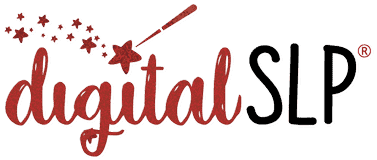
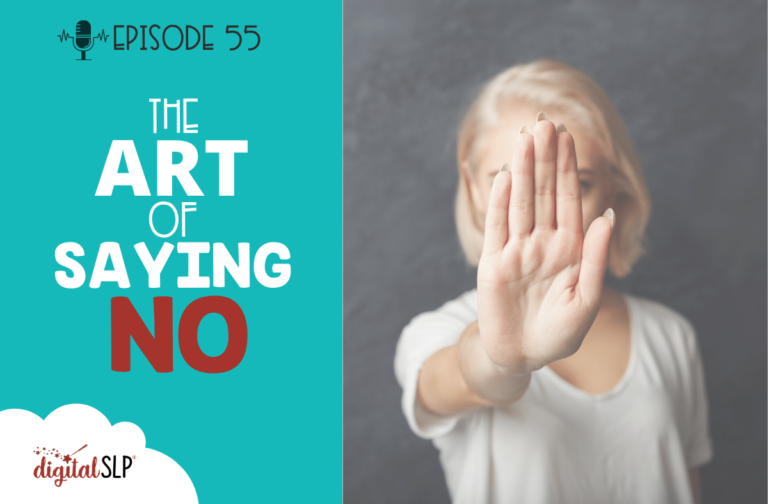
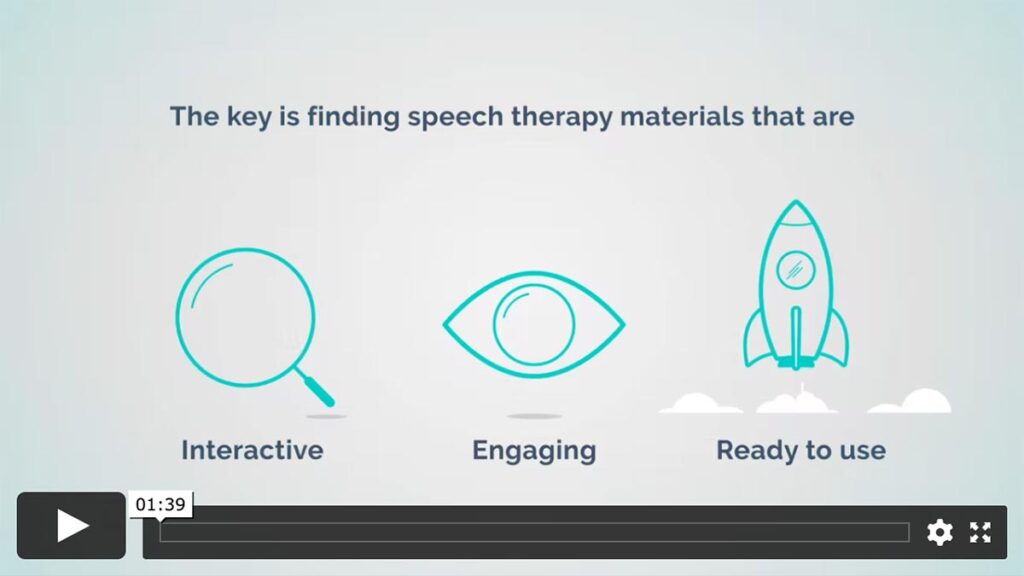
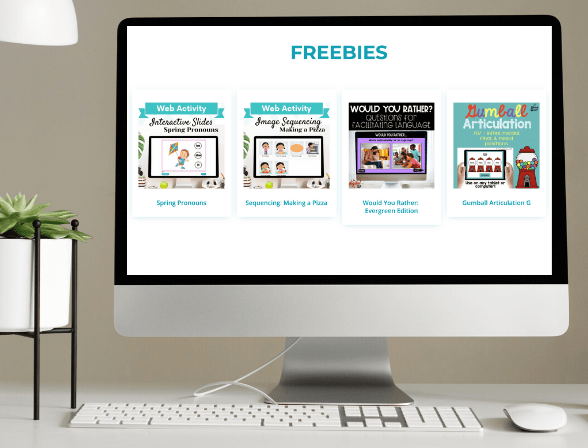

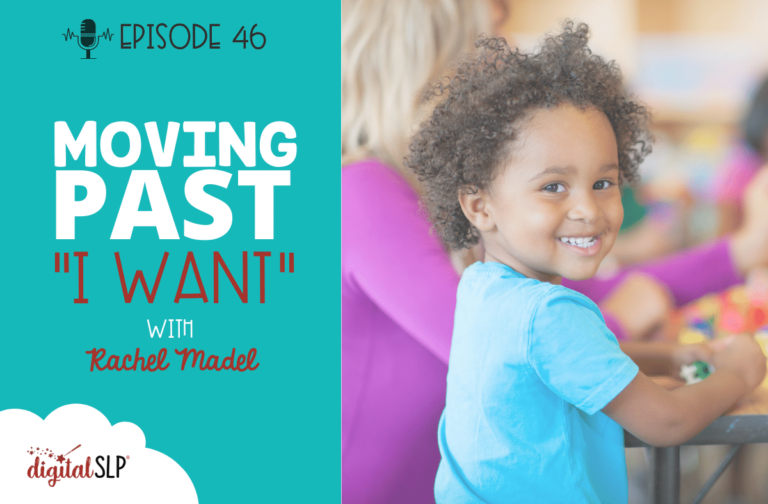




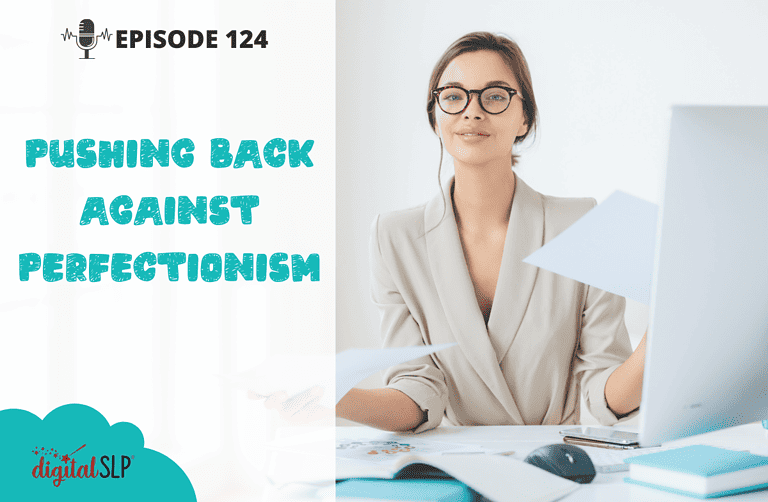

Recent Comments